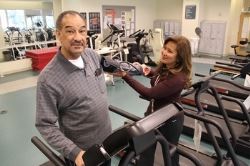
Open Accessibility Menu
Hide
dfh
Close Alert
Close Alert
Washington Hospital has been a leader in surgical intervention and treatment of adult heart disease for decades. The cardiac surgery program focuses on a multidisciplinary approach to providing care for our patients.
 The cardiac surgery program at Washington Hospital recognizes the importance
of meeting the needs of our patients. We have assembled a team of expert
healthcare providers that support and care for our patients and families.
The patient who has cardiac surgery at Washington Hospital will meet with
the cardiac surgeon, the anesthesiologist, our pre-operative staff, and
one of our cardiac rehabilitation nurses. Prior to surgery the patient
and his/her family will be interviewed and examined in order to plan for
their specific needs prior to, during and after surgery.
The cardiac surgery program at Washington Hospital recognizes the importance
of meeting the needs of our patients. We have assembled a team of expert
healthcare providers that support and care for our patients and families.
The patient who has cardiac surgery at Washington Hospital will meet with
the cardiac surgeon, the anesthesiologist, our pre-operative staff, and
one of our cardiac rehabilitation nurses. Prior to surgery the patient
and his/her family will be interviewed and examined in order to plan for
their specific needs prior to, during and after surgery.
"The surgery saved my life," Lingle says. "I really encourage people to take control of their own health. If something doesn't seem right, get to the doctor."
Michael Lingle (left) is back to enjoying his several hobbies after his minimally invasive heart surgery at Washington Hospital.
If one or more of your coronary arteries (the vessels that carry blood to your heart muscle) are blocked, blood can’t flow to the heart muscle. In this case, the heart muscle may die (heart attack). Coronary artery bypass graft surgery creates a path for blood to flow around a blockage through a blood vessel graft that restores blood flow to the heart.
At Washington Hospital we offer an array of valve surgery options to our patients. These options range from traditional sternotomy to minimally invasive valve surgery.
 Immediately after surgery patients are cared for in the coronary care unit
(CCU) by our critical care nursing staff. Our experienced nursing staff
provides care using a combination of technological expertise and genuine
concern for the patient in order to meet the physical and emotional well-being
and comfort of our patients and families. The patient is transferred from
the coronary intensive care unit after they meet specific clinical criteria.
Patients remain on cardiac monitoring and begin to take meals and walk
in the room and hallways. Physical therapists and occupational therapists
begin working with our patients as soon as the patient is able.
Immediately after surgery patients are cared for in the coronary care unit
(CCU) by our critical care nursing staff. Our experienced nursing staff
provides care using a combination of technological expertise and genuine
concern for the patient in order to meet the physical and emotional well-being
and comfort of our patients and families. The patient is transferred from
the coronary intensive care unit after they meet specific clinical criteria.
Patients remain on cardiac monitoring and begin to take meals and walk
in the room and hallways. Physical therapists and occupational therapists
begin working with our patients as soon as the patient is able.
The goal of physical and occupational therapy is to assist the patient in their recovery from surgery and return to their previous level of activity. Dietitians review how to modify the patient's diet to provide a "heart healthy" approach to eating. When needed, our pharmacist provides medication counseling prior to discharge. A member of our case management team meets with the patient and family to develop a plan that will provide a safe and comfortable transition back to home prior to discharge. The discharge plan may include visits from home health assistants, registered nurses, and perhaps physical or occupational therapists.

Heart disease is the country’s number one health condition, and a comprehensive cardiology program lies at the center of our Healthcare System. People ...
Continue Reading
Dr. Nowwar Mustafa Joins Washington Township Medical Foundation Washington Township Medical Foundation (WTMF) warmly welcomes cardiologist Nowwar G. ...
Continue Reading
You likely know people should have their cholesterol levels checked periodically and need to keep them at certain levels to stay healthy, but what ...
Continue Reading
Washington Hospital is a Designated Cardiac Receiving Center Two days before Roger Wood’s 70th birthday, he started having chest pain. He was washing ...
Continue Reading
According to the Centers for Disease Control and Prevention, as many as 12.1 million in the United States in 2030 will have atrial fibrillation, or ...
Continue Reading
Also known as a massive heart attack or widow maker, a ST-elevation myocardial infarction (STEMI) occurs when one of the heart’s major arteries is ...
Continue Reading
Many people mistakenly assume that heart disease is just a men’s health issue. Yet heart disease also ranks as the number one killer of American ...
Continue Reading
Less than three months after an aortic valve replacement at Washington Hospital, 94-year-old Gonzala Ruelas of Hayward felt well enough to attend a ...
Continue Reading
What is a TAVR and how does it help patients get back to normal activity? You’ve been experiencing fatigue after the simplest of activities, and have ...
Continue Reading
More than 5 million Americans are diagnosed with heart valve disorders, also called valvular heart disease, each year. Diseases of the heart valves ...
Continue Reading